
|
Statements by Teachers in the Classroom on Controversial or Topical Issues Political dialogue within the classroom – a principled discussion following the political expression of a high-school civics teacher Education, Culture & Sport Committee Wednesday, 22/01/2014 | Committee Discussion
This discussion was added to the education committee’s agenda owing to the scandal surrounding the disciplinary actions taken against a high-school civics teacher in Tivon. |
|
Raising the Threshold for Knesset Elections
Amendment to Basic Law: Government Constitution, Law and Justice Committee Monday, 03/02/2014 | Preparation for a Second & Third Reading
These bills, known as the ‘governance laws’, seek to alter various aspects of the procedures for national elections and the functioning of the government and the Knesset. The Committee has already discussed most of the components of these bills and will focus this week on the proposal to raise the electoral threshold. |
|
Water Disconnections as a Result of Debt
Directives for Private Water Corporations Economic Affairs Committee Thursday, 30/01/2014 | Approval of Directive
ACRI’s Position: The draft regulations painstakingly formulated by the Water Authority, following multiple drafts and public hearings, constitute a slight improvement to the current situation and to past drafts, especially as it sets, for the first time, a prohibition against disconnecting certain population groups from the water supply. Nevertheless, certain basic principles and balances are absent from the draft guidelines, which together with some fundamental ambiguities, will continue to endanger human rights. ACRI’s position is that it is necessary to prohibit all water disconnections – ensuring a minimum supply of water per person. It is necessary to adopt a policy that recognizes access to water to be a fundamental human right, which would require water debts to be collected through legal or execution proceedings only, and not by cutting off the water supply. |
|
In the Spotlight:
+972 Photo diary: Inside Israel’s ‘Holot’ detention center for asylum seekers Tuesday, February 4 |








